基础英语中 特别容易混淆的东西
英语易混淆单词辨析
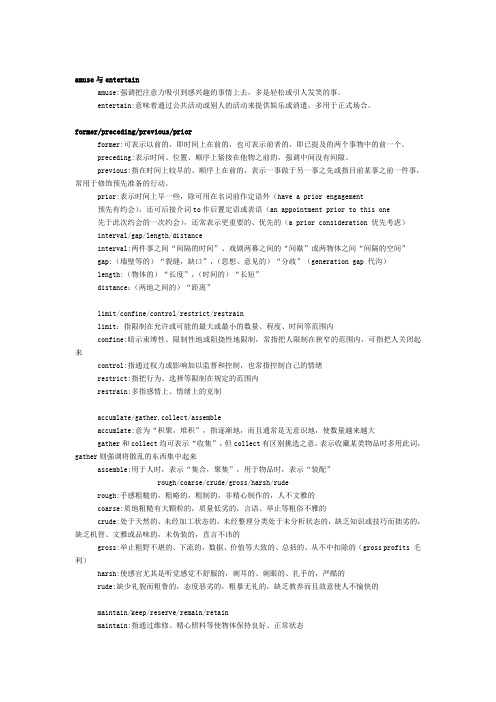
amuse与entertainamuse:强调把注意力吸引到感兴趣的事情上去,多是轻松或引人发笑的事。
entertain:意味着通过公共活动或别人的活动来提供娱乐或消遣,多用于正式场合。
former/preceding/previous/priorformer:可表示以前的,即时间上在前的,也可表示前者的,即已提及的两个事物中的前一个。
preceding:表示时间、位置、顺序上紧接在他物之前的,强调中间没有间隙。
previous:指在时间上较早的、顺序上在前的,表示一事做于另一事之先或指目前某事之前一件事,常用于修饰预先准备的行动。
prior:表示时间上早一些,除可用在名词前作定语外(have a prior engagement 预先有约会),还可后接介词to作后置定语或表语(an appointment prior to this one先于此次约会的一次约会),还常表示更重要的、优先的(a prior consideration 优先考虑)interval/gap/length/distanceinterval:两件事之间“间隔的时间”、戏剧两幕之间的“间歇”或两物体之间“间隔的空间”gap:(墙壁等的)“裂缝,缺口”,(思想、意见的)“分歧”(generation gap 代沟)length:(物体的)“长度”,(时间的)“长短”distance:(两地之间的)“距离”limit/confine/control/restrict/restrainlimit:指限制在允许或可能的最大或最小的数量、程度、时间等范围内confine:暗示束缚性、限制性地或阻挠性地限制,常指把人限制在狭窄的范围内,可指把人关闭起来control:指通过权力或影响加以监督和控制,也常指控制自己的情绪restrict:指把行为、选择等限制在规定的范围内restrain:多指感情上、情绪上的克制accumlate/gather,collect/assembleaccumlate:意为“积聚,堆积”,指逐渐地,而且通常是无意识地,使数量越来越大gather和collect均可表示“收集”,但collect有区别挑选之意,表示收藏某类物品时多用此词,gather则强调将散乱的东西集中起来assemble:用于人时,表示“集合,聚集”,用于物品时,表示“装配”rough/coarse/crude/gross/harsh/ruderough:手感粗糙的,粗略的,粗制的,非精心制作的,人不文雅的coarse:质地粗糙有大颗粒的,质量低劣的,言语、举止等粗俗不雅的crude:处于天然的、未经加工状态的,未经整理分类处于未分析状态的,缺乏知识或技巧而拙劣的,缺乏机智、文雅或品味的,未伪装的,直言不讳的gross:举止粗野不堪的、下流的,数据、价值等大致的、总括的、从不中扣除的(gross profits 毛利)harsh:使感官尤其是听觉感觉不舒服的,刺耳的、刺眼的、扎手的,严酷的rude:缺少礼貌而粗鲁的,态度恶劣的,粗暴无礼的,缺乏教养而且故意使人不愉快的maintain/keep/reserve/remain/retainmaintain:指通过维修、精心照料等使物体保持良好、正常状态keep:指通过主观控制使某种状态维持下去或某事物维持原状reserve:指为了某特殊目的而留出或保留,强调继续保持以备后用,可指保留意见、权利或力量等 remain:指继续某种状态、依然不变,还可指停留、留下以及剩下retain:表示保持、继续拥有一直拥有、原来拥有的东西sense/meaning/significancesense:常指词的各种不同解释,表示一词可有一个以上的意思,文章可有多层含义等,也指较为含蓄的意义,只有认真领会才能知晓meaning:含义较广,可指字面意义或隐含意义,还可指动机、目标、后果等significance:较正式,指赋予语言、行动、事件等的特殊、深层的意义instruct/teach/educateinstruct:在一定学科或领域内有条理地教授或指导必要的知识或技能teach:任何直接传授知识或技巧的行为educate:正式的系统的学校教育,也可指对人在某方面进行培养opportunity/chance/occasionopportunity:机会,时机,表示符合自己想干某事的意思、目的、雄心的时机,如:to grasp opportunity forbroader experience when it appears(抓住获得更丰富经历的机会)chance:机会,可能性,表示运气或偶然的时机、因为运气或偶然而出现的机遇,如:You still have the chance ofcatching the train.(你仍然有机会可能赶上火车)occasion:时机,场合,表示特定的时刻、场合,指能激发或唤起某人某种行为的适宜时间和地点,如:This is not an occasionfor laughter.(这种场合笑是不合时宜的)identical/same/equal/equivalent/similaridentical:可与same表达相同意思,指同一事物或人,指几个事物相同时,该词强调在各方面包括细节上完全一样或一致,常用于 A isidentical with/to B 的结构中same:用于单独的人或物时,表示“同一个”的意思强调完全一样,前面须加定冠词the(thesame...),此时与identical可互换,指两个或以上的人或物时,表示在种类、性质、数量等方面没有区别,常用于 A is the sameas B 的结构中equal:强调事物之间在数量、大小、价值、地位等可衡量的方面相等,常用于 A is equal to B 的结构中,还常指“平等的”,对群体中的成员人人同等,具有同样的特权、地位、或权力equivalent:多作表语,用于 A is equivalent to B的结构中,表示A在意义、价值或质量上与B相等,具有相同或相似效果的,还可作名词,表示“等价物”similar:表示相似的,类似的,指事物在大多数方面相同,但并非在每一细节上都相同,用于 A is similar to B 的结构中genuine/real/truegenuine:多表示某物为真品,而不是伪造或掺有杂质的,强调物体本身的纯真度real:强调所形容之物为实际存在的,并非假想或捏造的true:强调主观方面的现实性,即语言、故事、品质等与实际情况相符identity/statusidentity:意为“身份”即某人是谁(包括姓名、出生年月日、住址、籍贯、职业等信息因素)或某物是什么status:指人在社会群体中的身份、社会地位,一般是与其他人比较而言feature/mark/appearancefeature:意为“特征”,可指人的面部某个突出的特征mark:意为“标记、记号”,指物体表面的污点、划痕等appearance:意为“外表”,是某人的外部特征的总和risk/danger/venturerisk:表示危险,风险,冒险,含较强的知道危险的存在并主动冒险的意思,可作动词和名词danger:表示危险的常用词,可指迫在眼前的或潜在的危险状况,险情可强可弱、可大可小,只作名词venture:通常指冒险事业,即危险的、大胆的或结局不确定的事业,尤指商业上的投机、为赢利而进行冒险的企业,可作名词和动词trace/tracktrace:作动词表示跟随…的道路、追踪…的足迹,或指追溯、探索确定在…的发展或进程中的各个连续阶段,还可指通过寻找或研究证据确定或发现来源track:作动词可表示追踪、跟踪动物、飞机、船只、人等,常指观察或监测(如飞机、太空飞行器)的航道conventional/routine/regular/standardconventional:“常规的,传统的”,指符合历来的做法、风俗的,也有“保守、守旧”之意routine:“例行的,常规的”,指符合日常习惯做法的regular:“规则的,定期的,经常的”,指每隔一段时间或几乎每次必然发生、出现的standard:“标准的”,表示是通常使用的而非特殊或罕见的appointment/engagement/dateappointment:具体的、约好了见面时间和地点的约会,尤其是与重要人物或官员的正式会面engagement:同某人见面、外出或一起做事的约定,也指婚约date:多指男女之间的约会,有时也可表示事先安排好的其他性质的约会,如:a date with one's hairdresser(和理发师的预约)reputation/fame/honorreputation:指公众对某人或某事的评价,可指好名声,也可指坏名声,强调在人们心目中的形象fame:指由于某种具体原因如品质高尚、能力非凡或业绩辉煌等而享有的名气、名望,强调知名度以及闻名的原因honor:指某人或某物享有的光荣、荣誉、名誉,强调受到尊重influence/authouity/powerinfluence:表示权势、权力时,指因其品格或经济、社会地位而获得的影响他人的势力authouity:指因地位、官职而得到的足以命令他人服从的合法权力、管辖权power:常用词,可泛指权力、势力、政权等,常指对他人或他国具有极大控制力的人、集团或国家(the western powers 西方列强)focus/concentrate/center/aim/directfocus:本义为把光线集中在一个焦点上,常后接介词on,引申义指把注意力、兴趣等集中在某一件事物、事件上,此时常与concentrate换用,可作动词或名词concentrate:表示(使)集中或汇聚于同一个中心,常后接介词on表示专注于、全神贯注于,此时与focus同义,此外还常作名词指经过浓缩后的产物,尤指除水后数量或体积减小的食物center:作动词可表示放置在中心内或中心上,如:centered the vase on the table(放花瓶于桌子正中),还可表示引向一中心或一中心点、集中或聚焦,此意与focus相似。
英语四六级最易混淆词汇150组

英语四六级最易混淆词汇150组英语四六级最易混淆词汇150组词汇是英语四六级考试中最基础的部分,可有些词汇是常常容易让我们混淆的,下面是yjbys网店铺提供给大家关于英语四六级最易混淆词汇150组,希望对同学们的备考有所帮助。
1)quite相当quiet安静地2)affectv影响,假装effectn结果,影响3)adapt适应adopt采用adept内行4)angel天使angle角度5)dairy牛奶厂diary日记6)contend奋斗,斗争content内容,满足的context上下文contest竞争,比赛7)principal校长,主要的principle原则8)implicit含蓄的explicit明白的9)dessert甜食desert沙漠v放弃dissert写论文10)pat轻拍tap轻打slap掌击rap敲,打11)decent正经的descentn向下,血统descendv向下12)sweet甜的sweat汗水13)later后来latter后者latest最近的latelyadv最近14)costume服装custom习惯15)extensive广泛的intensive深刻的16)aural耳的oral口头的'17)abroad国外aboard上(船,飞机)18)altar祭坛alter改变19)assent同意ascent上升accent口音20)champion冠军champagne香槟酒campaign战役21)baron男爵barren不毛之地的barn古仓22)beam梁,光束bean豆beenhave过去式23)precede领先proceed进行,继续24)pray祈祷prey猎物25)chicken鸡kitchen厨房26)monkey猴子donkey驴27)chore家务活chord和弦cord细绳28)cite引用site场所sight视觉29)clash(金属)幢击声crash碰幢,坠落crush压坏30)compliment赞美complement附加物31)confirm确认conform使顺从32)contact接触contract合同contrast对照33)council议会counsel忠告consul领事34)crow乌鸦crown王冠clown小丑cow牛35)dose一剂药doze打盹36)drawndraw过去分词drown溺水37)emigrant移民[微博]到国外immigrant从某国来的移民38)excessn超过exceedv超过excel擅长39)hotel青年旅社hostel旅店40)latitude纬度altitude高度gratitude感激41)immoral不道德的immortal不朽的42)lone孤独的alone单独的lonely寂寞的43)mortal不死的metal金属mental神经的medal勋章model 模特meddle玩弄44)scare惊吓scarce缺乏的45)drought天旱draught通风,拖拉draughts(英)国际跳棋47)assure保证ensure使确定insure保险48)except除外expect期望accept接受excerpt选录exempt 免除49)floor地板flour面粉50)incident事件accident意外51)inspiration灵感aspiration渴望52)march三月,前进match比赛53)patent专利potent有力的potential潜在的54)police警察policy政策politics政治55)protest抗议protect保护56)require需要inquire询问enquire询问acquire获得67)revenge报仇avenge为.。
100组易混淆的英语词汇

100组易混淆的英语词汇1. able, capable, competentable为常用词,指具有做某事所需的力量,技巧,知识与时间等,一般下效率无关,用作定语表示能力超出平均水平。
如:A cat is able to see in the dark.capable 指满足一般要求的能力,可以是表现出来的,也可是潜在的,搭配是be capable of +doing。
用作定语,表示的能力没有able表示的能力强。
如:He is capable of runninga mile in a minute. He is a very capable doctor.competent 指“胜任”,“合格”,或受过专业技术等训练的,但不是超群的能力。
如:A doctor should be competent to treat many diseases.2. aboard, abroad, board, broadaboard 在船(或飞机,车)上。
如:I never went aboard a ship.abroad 副词,在国外或海外。
如:He often goes abroad.board 为动词,上(船,飞机,车)。
如:The passengers are boarding the plane now.broad 为形容词,宽广的。
如:He has very broad shoulders.3. accomplish, complete, finish, achieve, attainaccomplish表成功,强调完成的结果而不是过程。
如:Because of his hard word, things are accomplished. (由于他的努力,事情都已完成了。
)complete 表示积极的完成,更具体地指建筑、工程等的完成。
如:Has he complete his novel yet? (他的小说写完了吗?)finish 最常用,后接动词的-ing形式,表示在一个活动的连续过程中完成了最后的一步或阶段。
在翻译考试中容易混淆的英语词汇3

在翻译考试中容易混淆的英语词汇3 principal VS principle
principal:the head of a school 校长
例:The principal spoke to us today.
principle:a principle is an important fact or law. 例:The principle of democracy is important to ourcountry. stationary VS stationery
stationary:standing still 不动的、静止的。
例:Please remain stationary.
stationery:writing materials 文具、信纸。
例:They went to the store to buy some stationery uninterested VS disinterested
uninterested:指没有兴趣,索然无味,漠不关心。
例:An unterested student will not learn anything. 缺乏兴趣的学生什么都学不到。
词组:unterested attitude 漠不关心的态度
be uninterested in 对……无兴趣。
disinterested:则表示没有获得利益的动机,进而意指没有偏见,在美语中,也可以作漠不关心解
Two disinterested parties are needed to verify these documents for us. 我们需要两个公正的团体来查证这些文件。
英语中最容易混淆的相近词

英语中最容易混淆的相近词派生形容词1、Comparative 相对的Eg : He lives in comparative comfort.2、Comparable 比得上的There is no jewel comparable to diamond.3、Continual 不断发生的Continual invitation.4、Continuous连续的We have had continuous hot weather for a month.5、Considerate体贴的;考虑周到的It is very considerate of you to buy this for my brother.6、Considerable重要的;多的;相当的He has a considerable income.7、Considering就......而论;考虑到He looks young considering his age.8、Economic经济的The government’s economic policy9、Economical经济的;节约的We have to be economical and should save some money for a rainy day.10、Historic具有历史意义的;历史上有名的Lincoln made his historic speech at Gettysburg.11、Historical历史的A historical novel play.12、Industrious勤劳的My father was an industrious farmer.13、Industrial工业的The industrial areas of England.14、Imaginative想象力丰富的He is an imaginative poet.15、Imaginary假想的A imaginary enemy.16、Imaginable能想象的He tried every means(手段)imaginable.17、Momentous重大的The solution of the problem is very momentous to the development of our economy.18、Momentary瞬间的A momentary joy.19、Literal文字的Literal translation.20、Literary文学的A literary man the literary.21、Literate有学识的He is remarkable (非凡的)literate young man.22、Luxurious奢侈的;豪华的They are staying at a luxurious hotel.23、Luxuriant繁盛的;茂盛的The luxuriant vegetation of the tropics.24、Memorable不能忘记的;值得记忆的Memorable event.25、Memorial纪念的;记忆的A memorial service.26、Practical实际的;实用的He has acquired a practical knowledge of English.27、Practicable可实行的Methods that are not practicable.28、Sensible明智的It was sensible of her to follow his advice.29、Sensitive敏感的The eyes are sensitive to light.30、Sensory感觉的Sensory stimuli(刺激)31、Respectable值得尊敬的Respectable citizens.32、Respectful尊敬(别人)的You should be respectful to your superiors.33、Successful成功的My attempt to make a cake wasn’t very successful.34、Successive连续的It rained for five successive days.。
容易混淆拼错的英语单词
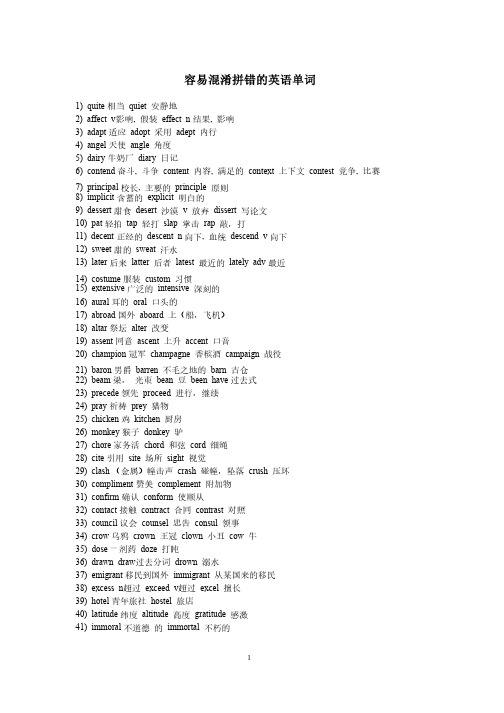
容易混淆拼错的英语单词1) quite 相当相当 quiet 安静地安静地2) affect v 影响影响, 假装假装 effect n 结果, 影响影响3) adapt 适应适应 adopt 采用采用 adept 内行内行4) angel 天使天使 angle 角度角度5) dairy 牛奶厂牛奶厂 diary 日记日记6) contend 奋斗, 斗争斗争 content 内容, 满足的满足的 context 上下文上下文 contest 竞争, 比赛比赛7) principal 校长, 主要的主要的 principle 原则原则 8) implicit 含蓄的含蓄的 explicit 明白的明白的9) dessert 甜食甜食 desert 沙漠沙漠 v 放弃放弃 dissert 写论文写论文10) pat 轻拍轻拍 tap 轻打轻打 slap 掌击掌击 rap 敲,打敲,打11) decent 正经的正经的 descent n 向下, 血统血统 descend v 向下向下12) sweet 甜的甜的 sweat 汗水汗水13) later 后来后来 latter 后者后者 latest 最近的最近的 lately adv 最近最近14) costume 服装服装 custom 习惯习惯15) extensive 广泛的广泛的 intensive 深刻的深刻的16) aural 耳的耳的 oral 口头的口头的17) abroad 国外国外 aboard 上(船,飞机)上(船,飞机)18) altar 祭坛祭坛 alter 改变改变19) assent 同意同意 ascent 上升上升 accent 口音口音20) champion 冠军冠军 champagne 香槟酒香槟酒 campaign 战役战役21) baron 男爵男爵 barren 不毛之地的不毛之地的 barn 古仓古仓22) beam 梁,梁, 光束光束 bean 豆 been have 过去式过去式23) precede 领先领先 proceed 进行,继续进行,继续24) pray 祈祷祈祷 prey 猎物猎物25) chicken 鸡 kitchen 厨房厨房26) monkey 猴子猴子 donkey 驴27) chore 家务活家务活 chord 和弦和弦 cord 细绳细绳28) cite 引用引用 site 场所场所 sight 视觉视觉29) clash (金属)幢击声(金属)幢击声 crash 碰幢,坠落碰幢,坠落 crush 压坏压坏30) compliment 赞美赞美 complement 附加物附加物31) confirm 确认确认 conform 使顺从使顺从32) contact 接触接触 contract 合同合同 contrast 对照对照33) council 议会议会 counsel 忠告忠告 consul 领事领事34) crow 乌鸦乌鸦 crown 王冠王冠 clown 小丑小丑 cow 牛35) dose 一剂药一剂药 doze 打盹打盹36) drawn draw 过去分词过去分词过去分词 drown 溺水溺水37) emigrant 移民到国外移民到国外 immigrant 从某国来的移民从某国来的移民38) excess n 超过超过超过 exceed v 超过超过 excel 擅长擅长39) hotel 青年旅社青年旅社 hostel 旅店旅店40) latitude 纬度纬度 altitude 高度高度 gratitude 感激感激41) immoral 不道德不道德 的 immortal 不朽的不朽的42) lone 孤独的孤独的 alone 单独的单独的 lonely 寂寞的寂寞的43) mortal 不死的不死的 metal 金属金属 mental 神经的神经的 medal 勋章勋章 model 模特meddle 玩弄玩弄44) scare 惊吓惊吓 scarce 缺乏的缺乏的 45) drought 天旱天旱 draught 通风, 拖 拉 draughts (英)国际跳棋国际跳棋47) assure 保证保证 ensure 使确定使确定 insure 保险保险48) except 除外除外 expect 期望期望 accept 接受接受 excerpt 选录选录 exempt 免除免除49) floor 地板地板 flour 面粉面粉50) incident 事件事件 accident 意外意外51) inspiration 灵感灵感 aspiration 渴望渴望52) march 三月, 前进前进 match 比赛比赛 53) patent 专利专利 potent 有力的有力的 potential 潜在的潜在的54) police 警察警察 policy 政策政策 politics 政治政治55) protest 抗议抗议 protect 保护保护56) require 需要需要 inquire 询问询问 enquire 询问询问 acquire 获得获得67) revenge 报仇报仇 avenge 为...报仇报仇68) story 故事故事 storey 楼层楼层 store 商店商店69) strike 打 stick 坚持坚持 strict 严格的严格的70) expand 扩张扩张 expend 花费花费 extend 延长延长71) commerce 商业商业 commence 开始开始72) through 通过通过 thorough 彻底的彻底的 (al)though 尽管尽管 thought think 过去分词过去分词73) purpose 目的目的 suppose 假设假设 propose 建议建议74) expect 期望期望 respect 尊敬尊敬 aspect 方面方面 inspect 视察视察 suspect 怀疑怀疑75) glide 滑翔滑翔 slide 使滑行使滑行 slip 跌落跌落76) steal 偷 steel 钢77) strive 努力努力 stride 大步走大步走78) allusion 暗示暗示 illusion 幻觉幻觉 delusion 错觉错觉 elusion 逃避逃避79) prospect 前景前景 perspective 透视法透视法80) stationery 文具文具 stationary 固定的固定的81) loose 松的松的 lose 丢失丢失 loss n 损失损失 lost lose 过去式过去式82) amend 改正, 修正修正 emend 校正校正83) amoral unmoral immoral 同义同义 不道德的不道德的84) capitol 大厦大厦 capital 首都首都85) casual 随便的随便的 causal 表原因的表原因的86) extend 延伸延伸 extent 长度长度 extant 现存的现存的87) inability 没能力没能力 disability 残疾残疾88) personnel 人事人事 personal 个人的个人的89) statue 塑像塑像 statute 法令法令 stature 身长身长 status 地位地位90) widow 寡?window 窗户窗户91) socks 短袜短袜 stockings 长筒袜长筒袜92) tax 税 taxi 出租出租93) definite 不定的不定的 infinite 无限的无限的94) grim 严酷的严酷的 grime 污点污点95) crayon 蜡笔蜡笔 canyon 山谷山谷96) recent 最近最近 resent 生气生气97) phrase 短语短语 phase 阶段阶段98) mission 使命使命 emission 散发, 发射发射 mansion 大厦大厦99) vision 视觉视觉 version 译本译本 100) gasp 上气不接下气上气不接下气 grasp 抓住抓住101) delicate 微妙的微妙的 dedicate 献身献身101) idle 空闲的空闲的 idol 偶像偶像102) induce 促使,劝诱劝诱 deduce 推测推测 reduce 减少减少 seduce 诱使诱使 103) lapse 流逝流逝 elapse 消逝消逝 eclipse 日食日食104) rude 粗鲁的粗鲁的 crude 天然的天然的105) source 水源水源 sauce 酱油酱油 saucer 茶托茶托 resource 资源资源 recourse 求援求援 106) sled (儿童)雪橇雪橇 sledge 雪橇雪橇107) stripe 条纹条纹 strip 条 trip 旅行旅行108) vocation 职业职业 vacation 假期假期 evocation 召集召集 revocation 撤回撤回 109) ardor 热情热情 adore 崇拜崇拜 adorn 装饰装饰110) area 区域区域 era 时代时代111) resemble 象... assemble v 集合集合,装配装配 assembly n 集合, 装配装配 112) assume 假定假定 resume 恢复恢复113) attain 达到达到 obtain 获得获得 abstain 放弃放弃114) award 授予授予 reward 奖赏奖赏115) baggage (American English) luggage 行李行李116) badge 徽章徽章 bandage 绷带绷带117) blade 刀刃刀刃 bald 秃的秃的 bold 大胆大胆118) bloom 开花开花 blossom 开花(结果实) bosom 胸口胸口 119)blush 脸红脸红 flush 发红(脸) 120) bride 新娘新娘 bribe 贿赂贿赂121) growl 咆哮咆哮 howl 狼叫狼叫122) depress 使沮丧使沮丧 suppress 镇压镇压 oppress 压迫压迫 123) dime 一角一角 dim 暗淡的暗淡的124) dizzy 眼花缭乱眼花缭乱 dazzle 使眼花使眼花125) brown 褐色褐色 brow 眼眉眼眉 blow 打击打击126) bullet 子弹子弹 bulletin 公告公告127) carton 纸板盒纸板盒 cartoon 动画动画128) chivalry 骑士精神骑士精神 cavalry 骑兵队骑兵队129) collar 领子领子 cellar 地窖地窖 color 颜色颜色130) vanish 消失消失 evanish 使消失使消失131) intrude 入侵入侵 extrude 逐出逐出 detrude 推下推下132) contort 扭弯扭弯 distort 弄弯弄弯 retort 反驳反驳133) eminent 杰出的杰出的 imminent 逼近的逼近的134) decline 下降下降 recline 放置放置 incline 倾斜倾斜135) exclaim 呼喊呼喊 proclaim 宣布宣布 acclaim 欢呼欢呼 declaim 朗诵朗诵 136) edict 法令法令 indict 控告控告137) perfuse 泼洒泼洒 profuse 浪费的浪费的138) reject 拒绝拒绝 eject 逐出逐出 inject 注射注射 deject 使沮丧使沮丧 139) literacy 识字识字 literary 文学的文学的 literature 文学文学 literal 文字的文字的140) median 中央的,中线的中线的 medium 媒体媒体 141) expel 驱逐驱逐 repel 反击反击 impel 推动推动 dispel 驱散驱散 142) rip 撕 ripe 熟的熟的 143) wench 绞车绞车 wrench 扭伤扭伤144) confidant 知己知己 confident 有信心的有信心的 145) dine 吃饭吃饭 diner 吃饭人吃饭人 dinning n 吃饭吃饭 dinner 晚饭晚饭 146) dreg 渣滓渣滓 drag 拖拉拖拉147) faint 失去知觉失去知觉 feint 佯攻佯攻148) imprudence 轻率轻率 impudence 无耻无耻 149) specie 硬币硬币 species 种类种类 150) hanger 钩子钩子 hangar 棚厂棚厂 hunger 饥饿饥饿 151) suite 一(套,批) suit 一套衣服一套衣服。
英语中经常容易混淆的词(一)

英语中经常容易混淆的词(一)❶receive and takereceive是“接到,收到”的意思,它常和介词from引导的短语连用,表示“从……得到”I have just received a letter from my brother. 我刚从我弟弟那里收到一封信。
take所包含的意思很多,有“拿走”的意思,它常和with、to、off、out of等介词连用。
如:Someone has taken my pen. 有人拿走了我的钢笔。
1. Yesterday I received a present from Aunt Jane. 昨天我收到了简姑姑的礼物。
2. Have you received a letter from him yet? 你已收到他的来信了吗?3. I took the letter with me. 我随身带着那封信。
4. He has taken some flowers to her. 他带了一些花给她。
5. Why did you take this book off the shelf ?你为什么把书从书架上取下来?❷salary and wagessalary:薪水,工资(指按月领取的)He collects his salary at the end of each month.他每个月末领取工资。
wages:工资,常用复数(指按小时,按日计工的,每周领取的)The workmen collected their wages at the end of the week.工人们每周末领工资。
❸borrow and lendborrow:借来,借入(同介词from连用) borrow sth from sb 向某人借某物He has never borrowed money from me. (1.5)lend:借给,借出(与介词to连用) lend sth to sb 把某物借给某人I asked him to lend me £20. I asked him to lend £20 to me.❹ask and ask for.ask (a question)问(一个问题):After the lesson, he asked me a question.课后他问了我一个问题。
英语中容易混淆的词组
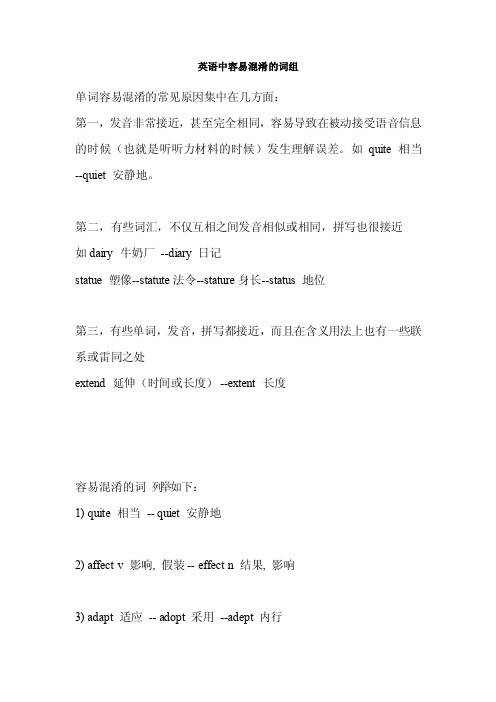
英语中容易混淆的词组单词容易混淆的常见原因集中在几方面:第一,发音非常接近,甚至完全相同,容易导致在被动接受语音信息的时候(也就是听听力材料的时候)发生理解误差。
如quite相当--quiet 安静地。
第二,有些词汇,不仅互相之间发音相似或相同,拼写也很接近如dairy牛奶厂--diary 日记statue塑像--statute法令--stature身长--status地位第三,有些单词,发音,拼写都接近,而且在含义用法上也有一些联系或雷同之处extend延伸(时间或长度) --extent长度容易混淆的词列举如下:1) quite 相当-- quiet 安静地2) affectv 影响, 假装 -- effectn 结果, 影响3) adapt 适应-- adopt 采用--adept 内行4) angel 天使--angle 角度5) dairy 牛奶厂--diary 日记6) contend奋斗, 斗争--content内容, 满足的context上下文--contest竞争, 比赛7) princip al 校长, 主要的 --princip le 原则8) implici t 含蓄的 --explici t 明白的9) dessert甜食 --desert沙漠v 放弃--dissert写论文10) pat 轻拍--tap 轻打--slap 掌击-rap 敲,打11) decent正经的 --descent n 向下, 血统 --descend v 向下12) sweet 甜的--sweat 汗水13) later 后来-- latter后者 --latest最近的 --latelyadv 最近14) costume服装 --custom习惯15) extensi ve 广泛的 --intensi ve 深刻的16) aural 耳的--oral 口头的17) abroad国外 --aboard上(船,飞机)18) altar 祭坛--alter 改变19) assent同意 --ascent上升 --accent口音20) champio n 冠军 --champag ne 香槟酒-- campaig n 战役21) baron 男爵--barren不毛之地的--barn 古仓22) beam 梁,光束--bean 豆--been have 过去式23) precede领先 --proceed进行,继续24) pray 祈祷--prey 猎物25) chicken鸡 --kitchen厨房26) monkey猴子-- donkey驴27) chore 家务活--chord 和弦-- cord 细绳28) cite 引用--site 场所--sight 视觉29) clash (金属)幢击声--crash 碰幢,坠落--crush 压坏30) complim ent 赞美 --complem ent 附加物31) confirm确认 --conform使顺从32) contact接触-- contrac t 合同 --contras t 对照33) council议会--counsel忠告 --consul领事34) crow 乌鸦--crown 王冠--clown 小丑--cow 牛35) dose 一剂药--doze 打盹36) drawn draw 过去分词--drown 溺水37) emigran t 移民到国--immigra nt 从某国来的移民38) excessn 超过--exceedv超过--excel 擅长39) hotel 青年旅社--hostel旅店40) latitud e 纬度--altitud e 高度--gratitu de 感激41) immoral不道德的 --immorta l 不朽的42) lone 孤独的--alone 单独的--lonely寂寞的43) mortal不死的--metal 金属--mental神经的medal勋章--model 模特--meddle玩弄44) scare 惊吓--scarce缺乏的45) drought天旱 --draught通风, 拖拉 --draught s (英)国际跳棋47) assure保证-ensure使确定--insure保险48) except除外--expect期望--accept接受--excerpt选录--exempt免除49) floor 地板--flour 面粉50) inciden t 事件--acciden t 意外51) inspira tion 灵感 --aspirat ion 渴望52) march 三月, 前进--match 比赛53) patent专利 --potent有力的--potenti al 潜在的54) police警察--policy政策--politic s 政治55) protest抗议--protect保护56) require需要 --inquire询问 --enquire询问 --acquire获得67) revenge报仇--avenge为...报仇68) story 故事 --storey楼层--store 商店69) strike打--stick 坚持-- strict严格的70) expand扩张 --expend花费--extend延长71) commerc e 商业 --commenc e 开始72) through通过--thoroug h 彻底的--(al)though尽管--thought think 过去分词73) purpose目的 --suppose假设 --propose建议74) expect期望--respect尊敬-- aspect方面-- inspect视察--suspect 怀疑75) glide 滑翔--slide 使滑行--slip 跌落76) steal 偷--steel 钢77) strive努力--stride大步走78) allusio n 暗示 --illusio n 幻觉--delusio n 错觉 --elusion逃避79) prospec t 前景 --perspec tive 透视法80) station ery 文具--station ary 固定的81) loose 松的--lose 丢失-- loss n 损失-- lost lose过去式82) amend 改正, 修正--emend 校正83) amoralunmoral immoral同义不道德的84) capitol大厦--capital首都85) casual随便的--causal表原因的86) extend延伸 --extent长度 --extant现存的87) inabili ty 没能力--disabil ity 残疾88) personn el 人事--persona l 个人的89) statue塑像--statute法令--stature身长 ---status地位90) widow 寡妇 --window窗户91) socks 短袜 --stockin gs 长筒袜92) tax 税--taxi 出租93) definit e 不定的 --infinit e 无限的94) grim 严酷的--grime 污点95) crayon蜡笔 --canyon山谷96) recent最近--resent生气97) phrase短语--phase 阶段98) mission使命--emissio n 散发, 发射--mansion大厦99) vision视觉 --version译本100) gasp 上气不接下气--grasp 抓住。
最易混淆的英语单词

最易混淆的英语单词英语中有很多容易混淆的单词,这些单词可能具有相似的拼写或含义,或者可能因为文化差异而容易混淆。
1. accept / except这两个单词都以“cept”结尾,但它们的含义完全不同。
“Accept”意思是“接受”,而“except”意思是“除了”。
2. affect / effect这两个单词都以“fect”结尾,但它们的意思也不同。
“Affect”通常用作动词,表示“影响”,而“Effect”通常用作名词,表示“效果”。
3. then / than这两个单词看起来很相似,但它们的用法完全不同。
“Then”通常用作时间连词,表示“然后”,而“Than”用于比较,表示“比……”。
4. homonym / synonym这两个单词看起来很相似,但它们的含义完全不同。
“Homonym”是指具有相同发音但拼写和含义不同的单词,例如“to / too / two”,而“synonym”是指具有相同或相似含义的单词。
5. there / their / they’re这三个单词看起来很相似,但它们的拼写和发音都不同。
“There”是一个副词,表示“那里”,而“their”是形容词性物主代词,表示“他们的”,而“they’re”是缩写形式,表示“他们是”。
6. could / would / should这三个单词看起来很相似,但它们的用法和含义都不同。
“Could”表示过去或现在的能力,“would”表示过去的习惯或意愿,“should”表示应该或责任。
7. which / that这两个单词看起来很相似,但它们的用法和含义也不同。
“Which”通常用于引导一个从句,而“that”可以作为代词或连词,用于代替名词或连接句子。
7. which / what / who这三个单词看起来很相似,但它们的用法和含义也不同。
“Which”通常用于引导一个从句,表示选择,“what”可以表示“什么”,也可以用于引导从句,“who”通常用于询问人的身份。
20个容易混淆的英文单词
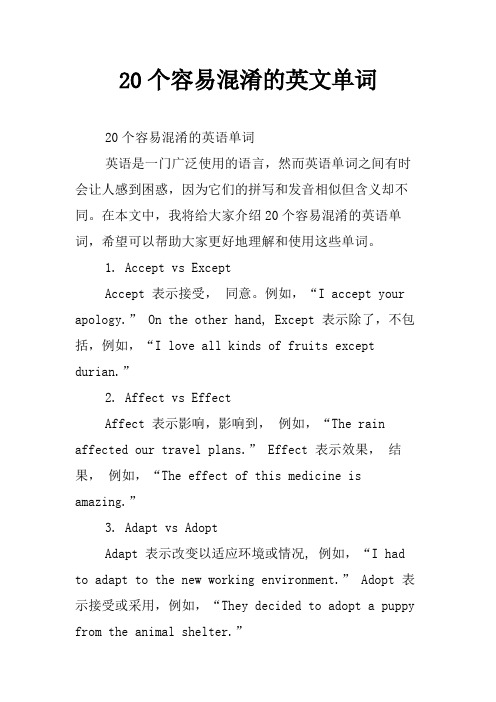
20个容易混淆的英文单词20个容易混淆的英语单词英语是一门广泛使用的语言,然而英语单词之间有时会让人感到困惑,因为它们的拼写和发音相似但含义却不同。
在本文中,我将给大家介绍20个容易混淆的英语单词,希望可以帮助大家更好地理解和使用这些单词。
1. Accept vs ExceptAccept 表示接受,同意。
例如,“I accept your apology.” On the other hand, Except 表示除了,不包括,例如,“I love all kinds of fruits except durian.”2. Affect vs EffectAffect 表示影响,影响到,例如,“The rain affected our travel plans.” Effect 表示效果,结果,例如,“The effect of this medicine is amazing.”3. Adapt vs AdoptAdapt 表示改变以适应环境或情况, 例如,“I had to adapt to the new working environment.” Adopt 表示接受或采用,例如,“They decided to adopt a puppy from the animal shelter.”4. Advice vs AdviseAdvice 是名词, 意思是建议。
例如,“She gave me some good advice about how to prepare for the exam.” Advise 是动词,意思是建议,例如,“I would advise you to take the train instead of driving.”5. Compliment vs ComplementCompliment 表示赞美或恭维某人,例如,“She received many compliments on her new hairstyle.” Complement 表示补充或完善,例如,“The red wine complements the beef dish perfectly.”6. Desert vs DessertDesert 是沙漠的意思,例如,“The Sahara Desert is the largest desert in the world.” Dessert 是甜点或果酱,例如,“I ordered chocolate cake for dessert.”7. Fewer vs LessFewer 是用于可数名词的数量, 指数量更少,例如,“There are fewer people in the library today than yesterday.” Less 是用于不可数名词,表示数量更少,例如,“I need less sugar in my coffee.”8. Imply vs InferImply 是表示暗示或表达某种意思,例如,“She implied that she is not interested in going outwith him.” Infer 是由已知事实推断出结论,例如,“She inferred from his expression that he was not happy.”9. Its vs It’sIts 是形容词性物主代词,意思是属于它的, 例如,“The cat licked its paws.” It's 是缩写,意思是它是,例如,“ It's a beautiful day today.”10. Loose vs LoseLoose 是形容词,表示松的,例如,“These pants are too loose for me.” Lose 是动词, 意思是失去,例如,“I don't want to lose my keys again.”11. Principal vs PrinciplePrincipal 是名词, 表示校长或负责人, 例如,“The new principal of our school is very str ict.” Principle 是名词, 表示基本原则或信念,例如,“I believe in the principle of honesty.”12. Stationary vs StationeryStationery 是文具的意思,例如,“I need to buy some stationery for school.” Stationary 是形容词,表示不动的,例如,“The car was stationary at the traffic light.”13. Than vs ThenThan 是用于比较的介词,例如,“She is taller than her sister.” Then 是表示时间或顺序的副词,例如,“I will finish my homework first, then I will watch TV.”14. Their vs They're vs ThereTheir 是形容词性物主代词,意思是他们的,例如,“Their car is parked in the driveway.” They're 是缩写,意思是他们是,例如,“They'r e going to the beach this weekend.” There 是副词,意思是那里或有,例如,“There is a cat on the roof.”15. To vs TooTo 是介词,在动词后面使用,例如,“I am going to the store.” Too 是副词, 表示过度或也,例如,“It's too hot outside.”16. Weather vs WhetherWeather 是天气的意思, 例如,“The weather is perfect for hiking.” Whether 是连词,是否的意思, 例如,“I'm not sure whether I should take the job or not.”17. Who vs WhomWho 是指代主语, 例如,“Who is that girl over there?” Whom 是指代宾语,例如,“Whom did you give the book to?”18. Your vs You'reYour 是形容词性物主代词,意思是你的,例如,“Your shoes are nice.” You're 是缩写,意思是你是,例如,“You're so kind.”19. Bear vs BareBear 是名词和动词,意思是熊和忍受,例如,“The bear is in the forest.” “I can't bear the pain.” Bare 是形容词,意思是裸露的,例如,“She walked on the beach with bare feet.”20. Farther vs FurtherFarther 表示物理距离上的更远,例如,“I can thro w the ball farther than you can.” Further 表示程度或数量的更多,例如,“We need to do further research on this topic.”总结以上是20个容易混淆的英语单词,它们的意思相似但又有差距,因此在使用时需要特别留意。
三上英语易错、易混淆知识点整理

三上英语易错、易混淆知识点及题型整理1.字母容易易错、混淆的:(1)小写a和d书写规范,否则容易混淆,尤其是小写d的竖稍微长点;Gg的格式;(2)i(手写体和印刷体的区别,手写体I大写有两横);(3)I i和Ll的区分,单独的I到底是大写I还是小写的l,主要根据前后给的字母是大小写来判断,如果前后给的字母都是大写,那么l是大写I的可能性大,若前后都是小写,那么l很有可能是小写l;(4)j (手写体和印刷体的区别,手写体大写J有一横);(5)Pp和Qq书写容易混淆,分清p和q半圆的方向;(6)Tt,小写t注意竖弯不顶格写,另外竖弯是小弯,不能写成汉字“七”;(7)Uu,大写U没尾巴,小写有尾巴;(8)Yy大小写格式要注意,小写不能写成印刷体,要写成手写体;(9)听力题中,注意Rr和Ii的发音区别;(10)首字母大写的几种情况:一、句子开头,首字母大写;二、圆点.句号后第二句开头首字母也要大写;三、外国人人名首字母大写,如:Mike;中国人名字,姓和名首字母都要大写,如:Su Hai;地名首字母大写,如:Nanjing,Beijing;四、“I”“我”,任何时候都大写。
(11)字母题型区分三种:一、写出所给字母对应的大小写。
这样的题目给大写,你写对应的小写;给小写,你写对应的大写。
二、写出所给字母的上一个或下一个字母。
给你的是单个的大写或小写,你写的也是单个的大写或小写,如果给你的是字母组合,你也应该写字母组合。
三、把下列打乱顺序的字母按字母表重新排序写下来。
(大小写)题目给你的有可能全是大写或者全是小写,但是要注意括号里的提醒是大小写,所以你大小写都要写。
另外注意顺序有时不是一个接一个的顺序。
2.选择题中选项前的字母序号写大写还是小写。
选择题中选项前的字母序号是大写,你选择写的也是大写,如果选项前的字母序号是小写,你选择写的也是小写。
3.分清说话者是谁?学会找关键词。
(1)例如:Hi,Mike. 你好,迈克。
英语听力中易混淆词语

从三星移动设备发送在英语特别是英语听力中,单词容易错误的常见原因集中在四方面:第一,发音非常接近,甚至完全相同,容易导致在被动接受语音信息的时候(也就是听听力材料的时候)发生理解误差。
如quite 相当--quiet 安静地。
第二,有些词汇,不仅互相之间发音相似或相同,拼写也很接近,容易在练习听写的时候把单词写错。
如dairy 牛奶厂--diary 日记,以与statue 塑像--statute法令--stature身长--status 地位第三,对于一些发音特殊的词汇,考生总是记不住其正确发音,比如suite这个单词,很多考生容易把它的发音错误地理解为与suit这个单词相同,因而在听力中发生理解错误。
第四,有些单词,发音,拼写都接近,而且在含义用法上也有一些联系或雷同之处,因此在听力理解时难度极大。
如extend 延伸(时间或长度) --extent 长度以下是常见易混淆的单词1) quite 相当-- quiet 安静地2) affect v 影响, 假装-- effect n 结果,影响3) adapt 适应-- adopt 采用--adept内行4) angel 天使--angle 角度5) dairy 牛奶厂--diary 日记6) contend 奋斗, 斗争--content 内容,满足的context 上下文--contest 竞争, 比赛7) principal 校长, 主要的--principle原则8) implicit 含蓄的--explicit 明白的9) dessert 甜食--desert 沙漠v 放弃--dissert 写论文10) pat 轻拍--tap 轻打--slap 掌击-rap 敲,打11) decent 正经的--descent n 向下,血统--descend v 向下12) sweet 甜的--sweat 汗水13) later 后来-- latter 后者--latest 最近的--lately adv 最近14) costume 服装--custom 习惯15) extensive 广泛的--intensive 深刻的16) aural 耳的--oral 口头的17) abroad 国外--aboard 上(船,飞机)18) altar 祭坛--alter 改变19) assent 同意--ascent 上升--accent 口音20) champion 冠军--champagne 香槟酒-- campaign 战役21) baron 男爵--barren 不毛之地的--barn 古仓21) 更多学习内容,关注ABC微课堂22) beam 梁,光束--bean 豆--beenhave 过去式23) precede 领先--proceed 进行,继续24) pray 祈祷--prey 猎物25) chicken 鸡--kitchen 厨房26) monkey 猴子-- donkey 驴27) chore 家务活--chord 和弦-- cord细绳28) cite 引用--site 场所--sight 视觉29) clash (金属)幢击声--crash 碰幢,坠落--crush 压坏30) compliment 赞美--complement附加物31) confirm 确认--conform 使顺从32) contact 接触-- contract 合同--contrast 对照33) council 议会--counsel 忠告--consul 领事34) crow 乌鸦--crown 王冠--clown小丑--cow 牛35) dose 一剂药--doze 打盹36) drawn draw 过去分词--drown 溺水37) emigrant 移民到国--immigrant 从某国来的移民38) excess n 超过--exceed v超过--excel 擅长39) hotel 青年旅社--hostel 旅店40) latitude 纬度--altitude 高度--gratitude 感激41) immoral 不道德的--immortal 不朽的42) lone 孤独的--alone 单独的--lonely 寂寞的43) mortal 不死的--metal 金属--mental 神经的medal勋章--model模特--meddle 玩弄44) scare 惊吓--scarce 缺乏的45) drought 天旱--draught 通风, 拖拉--draughts (英)国际跳棋46) assure 保证-ensure 使确定--insure 保险47) except 除外--expect 期望--accept 接受--excerpt 选录--exempt 免除48) floor 地板--flour 面粉49) incident 事件--accident 意外50) inspiration 灵感--aspiration 渴望51) march 三月, 前进--match 比赛52) patent 专利--potent 有力的--potential 潜在的53) police 警察--policy 政策--politics政治54) protest 抗议--protect 保护55) require 需要--inquire 询问--enquire 询问--acquire 获得56) revenge 报仇--avenge 为...报仇57) story 故事--storey 楼层--store商店58) strike 打--stick 坚持-- strict 严格的59) expand 扩张--expend 花费--extend 延长60) commerce 商业--commence 开始61) through 通过--thorough 彻底的--(al)though 尽管--thought think 过去分词62) purpose 目的--suppose 假设--propose 建议63) expect 期望--respect 尊敬-- aspect 方面-- inspect 视察--suspect怀疑64) glide 滑翔--slide 使滑行--slip 跌落65) steal 偷--steel 钢65) 更多学习内容,关注ABC微课堂66) strive 努力--stride 大步走67) allusion 暗示--illusion 幻觉--delusion 错觉--elusion 逃避68) prospect 前景--perspective 透视法69) stationery 文具--stationary 固定的70) loose 松的--lose 丢失-- loss n 损失-- lost lose过去式71) amend 改正, 修正--emend 校正72) amoral unmoral immoral 同义不道德的73) capitol 大厦--capital 首都74) casual 随便的--causal 表原因的75) extend 延伸--extent 长度--extant 现存的76) inability 没能力--disability 残疾77) personnel 人事--personal 个人的78) statue 塑像--statute 法令--stature身长---status 地位79) widow 寡妇--window 窗户80) socks 短袜--stockings 长筒袜81) tax 税--taxi 出租82) definite 不定的--infinite 无限的83) grim 严酷的--grime 污点84) crayon 蜡笔--canyon 山谷85) recent 最近--resent 生气86) phrase 短语--phase 阶段87) mission 使命--emission 散发, 发射--mansion 大厦88) vision 视觉--version 译本89) gasp 上气不接下气--grasp 抓住90) delicate 微妙的--dedicate 献身91) idle 空闲的--idol 偶像92) induce 促使,劝诱--deduce 推测--reduce 减少--seduce 诱使93) lapse 流逝--elapse 消逝--eclipse日食94) rude 粗鲁的--crude 天然的95) source 水源-- sauce 酱油-- saucer 茶托-- resource 资源--recourse 求援96) sled (儿童)雪橇-- sledge 雪橇97) stripe 条纹-- strip 条-- trip 旅行98) vocation 职业--vacation 假期--evocation 召集--revocation 撤回99) ardor 热情--adore 崇拜--adorn装饰100) area 区域--era 时代101) resemble 象...--assemble v 集合,装配-- assembly n 集合, 装配102) assume 假定--resume 恢复103) attain 达到-- obtain 获得--abstain 放弃104) award 授予--reward 奖赏105) baggage (American English)luggage 行李106) badge 徽章--bandage 绷带107) blade 刀刃--bald 秃的--bold 大胆108) bloom 开花--blossom 开花(结果实)--bosom 胸口109)blush 脸红--flush 发红(脸)110) bride 新娘--bribe 贿赂111) growl 咆哮--howl 狼叫112) depress 使沮丧--suppress 镇压--oppress 压迫113) dime 一角-- dim 暗淡的114) brown 褐色--brow 眼眉--blow打击115) bullet 子弹--bulletin 公告116) carton 纸板盒--cartoon 动画117) chivalry 骑士精神--cavalry 骑兵队118) collar 领子--cellar 地窖--color 颜色119) vanish 消失--evanish 使消失120) intrude 入侵--extrude 逐出--detrude 推下121) contort 扭弯--distort 弄弯--retort 反驳122) eminent 杰出的--imminent 逼近的123) decline 下降-- recline 放置--incline 倾斜124) exclaim 呼喊proclaim 宣布--acclaim 欢呼--declaim 朗诵125) edict 法令--indict 控告126) perfuse 泼洒--profuse 浪费的127) reject 拒绝--eject 逐出--inject 注射--deject 使沮丧128) literacy 识字--literary 文学的--literature 文学--literal 文字的129) median 中央的,中线的--medium媒体130) expel 驱逐--repel 反击--impel推动--dispel 驱散131) rip 撕--ripe 熟的132) wench 绞车--wrench 扭伤133) confidant 知己--confident 有信心的134) dine 吃饭-- diner 吃饭人--dinning n 吃饭--dinner 晚饭135) dreg 渣滓--drag 拖拉136) faint 失去知觉--feint 佯攻137) imprudence 轻率--impudence无耻138) specie 硬币--species 种类139) hanger 钩子-- hangar 棚厂--hunger 饥饿140) suite 一(宾馆套房)--suit一套衣服来源:网络我们尊重原创者版权,除我们确实无法确认作者外,我们都会注明作者和来源。
初中容易搞混的英语单词

初中容易搞混的英语单词有很多初中的同学总是搞混英语单词,天天死记硬背但是却一点都记不住,考试的时候脑子一片空白,不怕,小编就太带给容易搞混的英语单词列表,大家可以参考一下。
初中常见的易混词1. abroad到国外go abroadboard板on board2. across 介词,表面穿过 walk across the roadcross 动词 cross the roadthrough 介词,空间穿过 go through the windowpast 介词,经过 walk past the post officepass 动词 pass the test3.alive 活着的 I am still alive.live 现场直播 is covered live居住 live in the citylively 活泼的 make his class lively and interestingliving make a living/ a living room4. lonely孤独 feel lonely孤零零 a lonely housealone独自 live alonealong沿着 walk along the street5. asleep 睡着的 fall asleepsleepy困倦的feel sleepy6. fall 落下,倒 fall downfell :fall的过去式 (fall—fell---fallen)feel 觉得 feel sleepy/tired---过去式felt7. badly---worseJim acted badly, but Tom did worse.well—betterHe plays football well and his father does better.8. boring, interesting, exciting, tiring…修饰物an interesting storybored, interested, excited, tired…修饰人 feel bored9. borrow 借进(以句子主语为参照物)May I borrow your pen?lend 借出(以句子主语为参照物)Could you lend me some money?keep 借一段时间How long can I keep the magazine?10. both两者都 Both of his parents are workers.all 三者以上都 All of my classmates are from China.neither 两者都不 Neither of my hands is clean.none没有一个(三者及以上)None of the four apples is/are red.nothing什么都没有There’s nothing in the fridge.11. care:take care ofcareful 形,仔细的be careful with firecarefully 副,仔细地 listen carefullycareless 形,粗心的 a careless studentcarelessly 副,粗心地drive carelesslycarelessness名,粗心 Your carelessness led to the mistake.12. take 带走(以说话者为中心)remember to take a raincoatbring 带来(以说话者为中心)bring your book herecarry 拿,无方向 Could you help me carry the books?13. close 动词,关闭close the door形,亲密的 my closest friendclosed 形,关着的 keep the door closed14. closely 副,密切地 work closely with us15. brave 形,勇敢的He is brave enough to save the old man.courage 名,勇气have the courage to tell him the bad newsbravely 副,勇敢地face the difficulties bravely16. dead 形,死的 have been deaddie 动,死亡 die of hungerdeath 名,死亡 the death of his pet makes him so sad.17. especially副,尤其 He is good at all subjects, especially maths.specially 副,专门 The pen is specially designed for the boy.special形,特殊的 a special day18. except 除了All the students except Tom will go for a school trip.expect 期待You are expected to bring it back when you return.19. excited形,激动的,修饰人feel excitedexciting形,激动人心的,修饰物 an exciting filmexcitedly 副,修饰人 shouted excitedlyexcitement名shout with excitement20.a little一些,修饰不可数名词 a little moneya few一些,修饰可数名词 a few treeslittle几乎没有,修饰不可数名词There’s little water in the glass, is it?few几乎没有,修饰可数名词 so few students21.form 形成 form a good reading habitfrom 从……22. France 法国/ French 法语German 德国的/ Germany 德国23. hard 努力 work hardhardly 几乎不 The boy hardly does his homework.24. healthy 健康的 keep healthyhealth 健康it’s good for your healthhealthily 健康地 eat healthily25. if 如果主将从现If he comes, I’ll call you.是否I don’t know if he will come here.whether 是否 (如与or连用,则用)I wonder whether he’ll come or not.weather 天气What will the weather be like tomorrow?26.include 动词包括The list includes the names of many famous writers.including 介词They have many pets, including three cats.27. invent 动词发明 Edison invented a lot of things.invention 名词发明 The invention made much difference to humans.inventor 名词发明者 Edison was a great inventor.28. last 上一个的 last year;最后的 make her last apperance动词,持续 The meeting will last one and a half hours.lasting 形,持久的 a lasting value29. lie 名词,谎言 tell a lie动词,说谎 He is always lying to us.动词,位于Japan lies to the east of China.动词,躺,平放 He likes lying on the grass.躺,平放;位于:lie—lay---lain说谎:lie-lied-lied30.luck 名,运气 good lucklucky 形,幸运的a lucky numberluckily 副,幸运的是 Luckily, we got better marks.unlucky/unluckily31. noise名,噪音Don’t make any noise.noisy 形,吵闹的 much too noisynoisily 副,吵闹地 talk noisily32. noise 噪音sound 声音We sat listening to the sound of the waves听起来 The music sounds beautiful.voice 嗓音 The singer has a sweet voice.33. provide 提供provide a chance for the boy=provide the boy with a chance offer :offer a chance to the boy=offer the boy a chance34. other别的,加名词 other studentsanother另一个I don’t like the pair of shoes, would you like to show me another pair?the other 两个中的另一个,常用one…the other Here is a shoe, where’s the other one?others= other+名词35. over/ under 年龄的上下above/ below温度,楼层的上下36. peace名词,和平 love peacepeaceful形,宁静的 a peaceful villagepeacefully 副,和平地we hope to solve the problem peacefully.37. pleasure名,乐意。
英语中经常容易混淆的词(三)
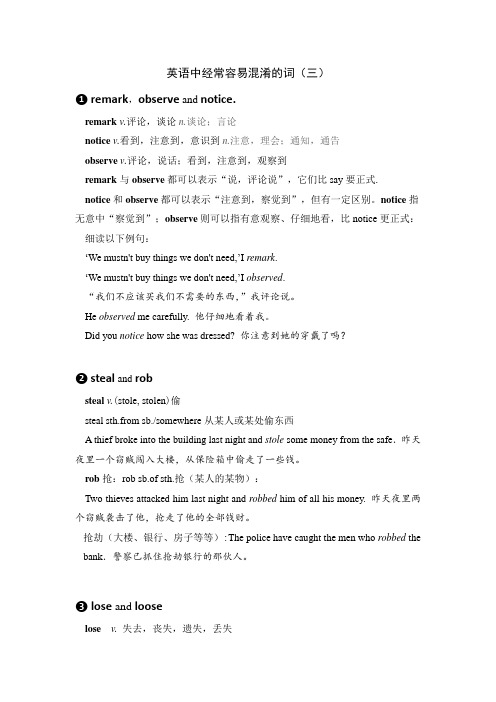
英语中经常容易混淆的词(三)❶remark,observe and notice.remark v.评论,谈论n.谈论;言论notice v.看到,注意到,意识到n.注意,理会;通知,通告observe v.评论,说话;看到,注意到,观察到remark与observe都可以表示“说,评论说”,它们比say要正式.notice和observe都可以表示“注意到,察觉到”,但有一定区别。
notice指无意中“察觉到”;observe则可以指有意观察、仔细地看,比notice更正式:细读以下例句:‘We mustn't buy things we don't need,’I remark.‘We mustn't buy things we don't need,’I observed.“我们不应该买我们不需要的东西,”我评论说。
He observed me carefully. 他仔细地看着我。
Did you notice how she was dressed? 你注意到她的穿戴了吗?❷steal and robsteal v.(stole, stolen)偷steal sth.from sb./somewhere从某人或某处偷东西A thief broke into the building last night and stole some money from the safe.昨天夜里一个窃贼闯入大楼,从保险箱中偷走了一些钱。
rob抢:rob sb.of sth.抢(某人的某物):Two thieves attacked him last night and robbed him of all his money. 昨天夜里两个窃贼袭击了他,抢走了他的全部钱财。
抢劫(大楼、银行、房子等等):The police have caught the men who robbed the bank.警察已抓住抢劫银行的那伙人。
最容易混淆的英文单词
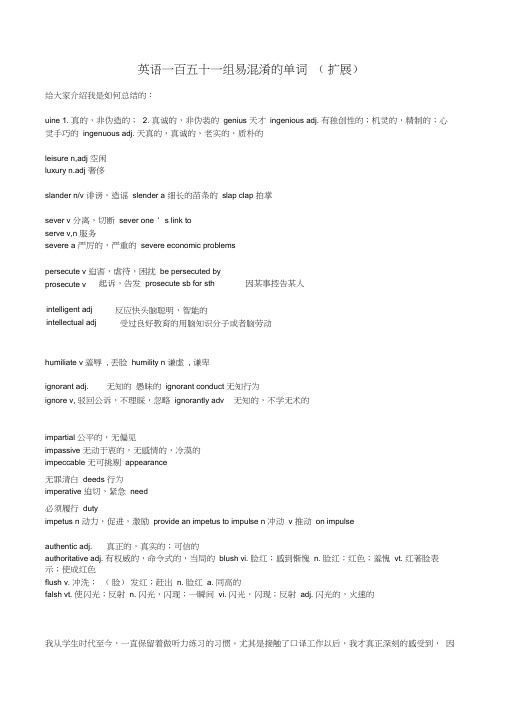
英语一百五十一组易混淆的单词 ( 扩展)给大家介绍我是如何总结的:uine 1. 真的,非伪造的; 2. 真诚的,非伪装的 genius 天才 ingenious adj. 有独创性的;机灵的,精制的;心灵手巧的 ingenuous adj. 天真的,真诚的,老实的,质朴的leisure n,adj 空闲 luxury n.adj 奢侈slander n/v 诽谤,造谣 slender a 细长的苗条的 slap clap 拍掌 sever v 分离,切断 sever one ' s link to serve v,n 服务severe a 严厉的,严重的 severe economic problems persecute v 迫害,虐待,困扰 be persecuted byhumiliate v 羞辱 , 丢脸 humility n 谦虚 , 谦卑 ignorant adj.无知的 愚昧的 ignorant conduct 无知行为ignore v, 驳回公诉,不理睬,忽略 ignorantly adv 无知的,不学无术的impartial 公平的,无偏见impassive 无动于衷的,无感情的,冷漠的 impeccable 无可挑剔 appearance无罪清白 deeds 行为imperative 迫切,紧急 need必须履行 dutyimpetus n 动力,促进,激励 provide an impetus to impulse n 冲动 v 推动 on impulseauthentic adj.真正的,真实的;可信的authoritative adj. 有权威的,命令式的,当局的 blush vi. 脸红;感到惭愧 n. 脸红;红色;羞愧 vt. 红著脸表示;使成红色flush v. 冲洗; ( 脸) 发红;赶出 n. 脸红 a. 同高的falsh vt. 使闪光;反射 n. 闪光,闪现;一瞬间 vi. 闪光,闪现;反射 adj. 闪光的,火速的我从学生时代至今,一直保留着做听力练习的习惯。
初中英语容易混淆的一词多义

初中英语容易混淆的一词多义1. An orange is orange. 橙子是橙色的。
2. First, let’s study the first lesson. 首先,我们学习第一课。
3. The ruler came along with a ruler in his hand. 那个统治者手里拿着一把尺子走来了。
4. In the classroom, he asked me a question in English. 他在教室里用英语问了我一个问题。
5. We learned the last lesson last Monday. 我们上周一学了最后一课。
6. Well, I think you can do it well. 嗯,我觉得你能干好这件事。
7. She wrote a number and said that was his room number. 她写下一个数字,说那是他的房号。
8. I was too tired, so I went to bed, too. 我太累了,因此我也睡了。
9. If you give me the key, I’ll tell you the key to the question. 如果你给我钥匙,我就告诉你这个问题的答案。
10. After the bell rang, he said, “If I find the ring, Iwill ring you.”铃响之后,他说:“如果我找到戒指,我会给你打电话的。
”11. He looked at his watch and said it was time to watch TV. 他看了一眼手表,说是看电视的时候了。
12. Where will you set this tea set? 你打算把这套茶具放置在哪里?13. I asked you to come to ask you a question. 我叫你来是想问你一个问题。
初中英语中混淆用an的单词

初中英语中混淆用an的单词
在英语中,元音音素开头的单词前面通常使用“an”,而非元音音素开头的单词前面使用“a”。
以下是一些容易混淆的单词:
1. an hour
2. a uniform
3. an honor
4. a university
5. an useful book
6. a usual practice
7. an hour’s walk
8. a European country
9. a useful dictionary
10. a useful tool
以上是一些常见的例子,但请注意,有些单词虽然以元音字母开头,但发音却以辅音音素开头,例如“useful”和“European”,这些词前应该用“a”。
另外,还有一些单词,虽然以辅音字母开头,但发音却以元音音素开头,例如“hour”和“honor”,这些词前应该用“an”。
因此,在选择使用“a”还是“an”时,最准确的方法是看发音,而不是看字母。
- 1、下载文档前请自行甄别文档内容的完整性,平台不提供额外的编辑、内容补充、找答案等附加服务。
- 2、"仅部分预览"的文档,不可在线预览部分如存在完整性等问题,可反馈申请退款(可完整预览的文档不适用该条件!)。
- 3、如文档侵犯您的权益,请联系客服反馈,我们会尽快为您处理(人工客服工作时间:9:00-18:30)。
基础英语中特别容易混淆的东西
1、a/an的区别
元音音素前用an(记住:是元音音素,不是元音字母).
如/ei/是元音音素,a是元音字母.
有时元音字母发的是元音,前面就用an,有时不发元音,就要用a.
如an apple 一个苹果an orange 一个橘子an egg 一个鸡蛋an important news 一条重要的新闻an ugly girl 一个丑陋的女孩
但: an hour 一小时因为h不发音,所以该词以/au/元音音素开头,故用an
a university 一所大学因为u发的音是/ju/,不是元音音素,故用a
英语国际音标共.48个音素.,其中元音音素20个,辅音音素28个。
48个音素如下:
2、ill和sick的区别
1. 两者都可表示“有病的”:作定语时通常用sick;作表语时可用ill(英) 或sick (美)。
如:
a sick man 病人be ill [sick] 生病
注:在英国英语中,用作表语的sick 可用来表示“呕吐的”或“恶心的”。
如:She feels sick in buses. 她在公共汽车上觉得想呕。
The long train ride made me sick. 长时间搭乘火车使我想吐。
因此若没有上下文, I was sick yesterday. 这类句子可能有歧义(可能表示“我昨天病了”或“我昨天想吐”)。
2. ill 表示“有病的”时,一般不用作定语,但当它表示“坏的(=bad)”、“有害的(= harmful)”等义时,却只能作定语,不能作表语。
如:
ill news 坏消息ill luck 运气不好ill health 身体不好
3. sick 表示“有病的”,可用作表语或定语,但若表示“厌烦的”,则只用作表语,其后通常接介词of。
如:
I’m sick of [= tired of] waiting around like this. 我厌烦像这样在一旁等着。
Get out! I’m sick of the sight of you. 滚出去,我一见到你就讨厌。
4. 表示“病人”,通常用the sick (相当于名词,具有复数意义),而不用the ill。
如:
They have come to see the sick. 他们已来看望过病人。
The sick were allowed to pass free. 病人可以免费通过。
5. 在下列短语中,两者一般不宜换用:
sick pay 病假津贴sick leave 病假
speak ill of 说某人的坏话think ill of 认为……不好
3、no longer与no more的意义区别
1. no longer中的longer是副词long的比较级,long有after a certain point of time(在某一时刻以后)之意,着重表示时间的不再延续,意为“如今不再”。
no longer等于
not... any longer。
2. no more中的more是many / much的比较级,more有again之意,着重表示数量或程度的
减少,意为“再也没有更多(大)的数量(程度)”。
no more等于not... any more。
二、时态区别
1. no longer / not... any longer表示不再继续或再现过去某一时刻发生或存在而一直
延续的动作/ 状态时,常用于过去时、现在时或将来时的句子中。
如:He was no longer a thief. 他不再是小偷了。
When there is no gravity, our feet no longer stay on the ground. 如果没有重力,我们的脚就不能再站稳在地面上。
2. no more / not... any more表示再也不重复过去反复发生的动作时,常用于过去时或
将来时的句子中。
如:
Now she wasn't afraid any more. 现在她再也不害怕了。
三、位置区别
当修饰动词时,no longer通常置于be或行为动词前;no more一般置于行为动词后。
not... any longer与not... any more常置于句末。
如:
She could no longer find a way to get into the valley. 她再也找不到进山谷的
路了。
Time or opportunity lost will return no more. 机不可失,时不再来。
四、修饰动词区别
1. no longer / not... any longer 习惯用来修饰表示状态的持续动词(如wait, live, work等)。
如:
Don't wait any longer. 别再等了。
She could not keep up with him any longer.她不能再赶上他了。
2. no more / not... any more通常用来修饰表示具体动作的瞬间动词(如go, stand,
visit等)。
如:
We couldn't stand it any more. 我们不能再忍受了。
五、作用区别
两者都可用来修饰动词,在句中作状语。
当no more作“不再(有、存在)”
解时,还可作定
语和宾语。
如:
Later when they are far away from the earth and there is no more gravity,
they find they are unable to stay in one place. 过后,当他们远离地球,到了不再有地球引力的地方时,他们发现自己不可能停留在一个地方不动。
(作定语)
I have no more to say. 我没有什么要说的了。
(作宾语)
综上所述,考例1应选D不选B。
考例2应选D。
A项中的not... any more 位置不对,B项中的
not... any longer位置也不对。
且A和C项中的not... any more通常不修饰谓语动词work。
4、other, another, the other , others的区别
这些不定代词不仅在含义上有单复数之分,而且在用法上有泛指(无the)和特指(有the)之别。
其用法区别可归纳如下:
1. 指单数时,若泛指用another,若特指用the other(后接单数名词):Give me another (one). 另外给我一个。
Shut the other eye, please. 请把另一只眼睛也闭上。
2. 指复数时,若泛指用other(后接复数名词),若特指用the other(后接复数名词):
There are other ways of doing it. 做这事还有其他的办法。
Where are the other students? 其他同学在哪里?
3. others永远表示复数意义,且其后不能再接名词。
其用法大致相当于“other+复数名词”,同样地the others 大致相当于“the other+复数名词”:
Other people [Others] may not think that way. 别的人可能不这样想。
He is cleverer than the others [the other students] in her class. 他比班上其他学生聪明。
4. another一般只能表单数,且其后接名词也只能接单数名词。
但是若其后有数词或few 修饰时,则也可接复数名词:
I shall stay another few months. 我将再待几个月。
They’ll give you another thousand dollars. 他们还会给你一千美元。
5. 与some对比使用时,用others(此时与some同义):
Some say yes, and others say no. 有人说对,有人说不对。
总结:other的意思是其他的,the other指两者中的另一个,another用于指三者或三者以上的另一个(one...the other...another...),the others是the other的复数形式。
